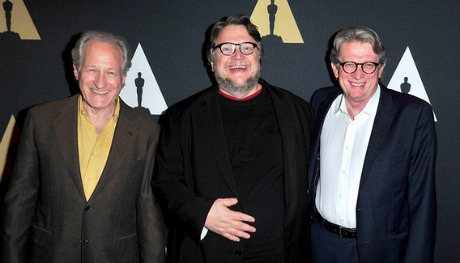“For many of us going to movies is like going to church. We go over and over and most of the time you don’t get very much, but it’s all worth it when a movie delivers the great beauty and the transcendence and the kiss of God, like from a great sermon. And that single ectstatic episode — that fix — is enough to keep us going back for years to come.”

(l. to r.) Michael Mann, Guillermo Del Toro and director of the Academy Museum of Motion Pictures Kerry Brougher prior to lastnight’s event — “In The Labyrinth: A Conversation with Guillermo Del Toro.”
This was the Guillermo del Toro quote that stayed with me as I shuffled out of last night’s discussion between the legendary director and interviewer Kerry Brougher at the AMPAS auditorium (i.e., the Samuel Goldwyn theatre).
The talk started out problematically with Brougher kissing Del Toro’s ass over and over, but eventually he let GDT have the floor and after that everything was fine. There is really no one more articulate, perceptive and spiritually imbued than Mr. Del Toro on the subject of film. Or any any subject. But we all know this. The discussion last for just over 90 minutes, and that was exactly right.
I saw GDT’s latest, Crimson Peak (Universal, 10.16), several weeks ago and will post my reaction next week sometime. It’s one of the most exquisitely painted and meticulously composed grand guignol orgies I’ve ever experienced, and I say that as someone who…well, who’s not as much into grand guignol orgies as others. Quite red, quite mad, quite sumptuous.
Read more








